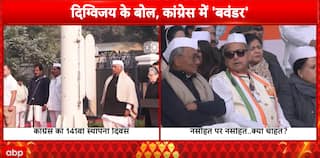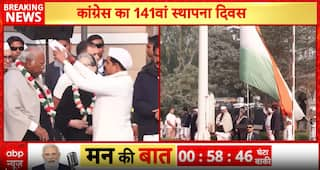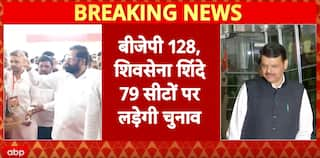Atal Bihari Vajpayee, 3-Time PM Who Transformed Coalition Politics And Economic Paradigms

Atal Bihari Vajpayee, a three-time Prime Minister of India, stands as a testament to the successful management of coalition governments. His visionary leadership and strategic acumen not only shaped the Bharatiya Janata Party's (BJP) image during his tenure but also created an image of the party that helped in its remarkable return to power with an unprecedented majority a decade later.
Vajpayee was that friendly leader who knew the difference between personal relations and politics. He represented the Government of India even when he was not in power. An illustrative instance of his adept leadership was his representation of India at the 1994 Geneva delegation as the opposition leader, successfully countering a resolution challenging India's sovereignty over Kashmir.
Vajpayee served as a member of the Lok Sabha ten times in his political career and was also elected to the Rajya Sabha twice. He went on to become the first non-Congress PM of India to serve a full term. Not one to compromise on ethics, he was optimistic that people would support you if your politics were right.
Vajpayee's famous slogan, 'Jai Jawan, Jai Kisan, Jai Vigyan', resonated with his commitment towards soldiers, farmers, and scientific progress. His approach to governance was characterised by collaboration, exemplified by his ability to successfully lead a government composed of 24 diverse parties.
Vajpayee Legacy As Leader Of BJP, Opposition, And Country
After the Emergency, when Morarji Desai's government was formed, Vajpayee took over the post of foreign minister and became the first leader to address the United Nations General Assembly in Hindi.
The defining moment of Vajpayee's political resilience came in 1996 when the BJP, after four decades in the opposition, formed a government with him as the PM. This was the first time Vajpayee became the PM.
Emerging as the single largest party in the 1996 general election, BJP had won 161 seats. Vajpayee was invited by then President Shankar Dayal Sharma to form the government. With the support of allies like George Fernandes' Samata Party, Shiv Sena, Akali Dal and Haryana Vikas Party (HVP), the BJP-led alliance could reach the figure of 194. It still lacked 78 MPs to touch the majority. This was a period when the BJP was generally considered "untouchable" by most of the political parties. He was forced to resign in 13 days. Vajpayee knew he would not be able to prove his majority, and could have directly submitted his resignation. But he preferred to move a motion of confidence in the Lok Sabha, instead.
A political visionary, Vajpayee wanted to remove the menace of untouchability that the BJP was facing. He wanted to use this defeat as an opportunity for future success. Vajpayee turned the trust vote into a tool for the BJP to open doors for coalition politics in the years to come. As the exceptional orator he was, he achieved his goal with his speech. BJP successfully formed a primary alliance for the first time. He later joined hands with Lok Janshakti Party, Telugu Desam Party, Biju Janata Dal and even DMK, National Conference, Jammu and Kashmir People's Democratic Party, and Trinamool Congress.
The National Democratic Alliance (NDA) came into existence before the 1998 Lok Sabha elections which it won. On May 11 and 13, 1998, Vajpayee surprised everyone with five underground nuclear tests at Pokhran, though much of the preparations for it had already been done by the Congress government led by Narasimha Rao.
His NDA government, however, lost its majority by early 1999, necessitating re-election.
On October 13, 1999, Atal Bihari became the PM for the third time with a coalition of 13 parties. This time, his government completed its full term of five years, and he became the first non-Congress PM to do so.
Pivotal Decisions That Transformed Economy
The Vajpayee government took many big decisions that changed the direction of Indian politics forever.
He paid attention to the country's infrastructure and the Golden Quadrilateral scheme connected Chennai, Kolkata, Delhi and Mumbai with the highway network, while the villages were strengthened with the Pradhan Mantri Gram Sadak Yojana. Along with this, all children were awarded their fundamental right to education.
Certain initiatives implemented by Vajpayee to strengthen the Indian economy served as a precursor to the current trajectory of economic development. When he left office, the Gross Domestic Product (GDP) stood at 8.4 per cent, inflation remained below 4 per cent, and foreign exchange reserves exhibited a favourable state. The UPA-I administration experienced favourable economic conditions in subsequent years.
Under Vajpayee’s leadership, the Government of India unveiled the New Telecom Policy on March 3, 1999, initiating the liberalisation of the telecommunications sector. The implementation of this measure was deemed imperative in order to diminish the involvement of the government in the management of business and industry. The telecommunications industry was experiencing a period of stagnation and sluggishness. Vajpayee's policy was instrumental in positioning India as the second-largest smartphone market globally, with projections indicating its potential to surpass China in the foreseeable future. The implementation of the new telecommunications policy effectively disrupted the dominance of state-owned telecommunications companies, thereby facilitating the entry and active involvement of private enterprises. This policy shift played a pivotal role in stimulating the subsequent revolution in the telecommunications industry. The presence of competition among private enterprises resulted in a notable reduction in tariffs and a substantial enhancement in the calibre of services provided. Indeed, the telecommunications industry stands as a notable example of private sector success in India.
One of the significant policy measures implemented by Vajpayee was the enactment of the Fiscal Responsibility and Budget Management (FRBM) Act in 2003. This legislation aimed to promote fiscal discipline in government expenditure, resulting in public sector savings equivalent to -0.8 per cent of the GDP in fiscal 2000. The percentage rose to 2.3 in 2005. The government under his leadership created specialised export processing zones, information technology and industrial parks to enhance industrial production and exports. This initiative played a pivotal role in laying the foundation for the successful implementation of the Make in India campaign a decade later. The introduction of Asset Reconstruction Companies (ARCs) and credit bureaus by the Vajpayee government marked an initial effort to assist banks in managing their non-performing assets.
Vajpayee's 'India Shining' campaign failed in 2004, but it helped the NDA pick up from where he left off when it returned to power a decade later. In essence, Atal Bihari Vajpayee's leadership transcended party lines and left an indelible mark on India's political and economic landscape.
The author is an Associate Professor at Atal Bihari Vajpayee School of Management and Entrepreneurship, Jawaharlal Nehru University (JNU), New Delhi.
[Disclaimer: The opinions, beliefs, and views expressed by the various authors and forum participants on this website are personal and do not reflect the opinions, beliefs, and views of ABP News Network Pvt Ltd.]


























